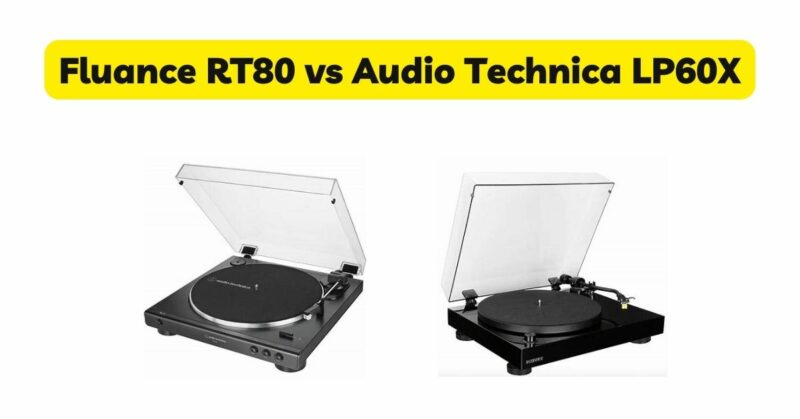If you’re in the market for an entry-level turntable, two popular options worth considering are the Fluance RT80 and the Audio-Technica LP60X. Both models offer affordable price points and convenient features that make them accessible to beginners and casual vinyl enthusiasts. In this article, we will compare the Fluance RT80 and the Audio-Technica LP60X across various aspects, helping you make an informed decision and choose the turntable that best suits your needs.
Design and Build Quality: The Fluance RT80 features a solid construction with a durable MDF (medium-density fiberboard) plinth, which helps minimize vibrations and improve overall sound quality. Its sleek design and glossy finish give it a modern and visually appealing look. On the other hand, the Audio-Technica LP60X sports a lightweight yet sturdy plastic chassis, making it highly portable and easy to set up. Its compact design and matte finish offer a simple and functional aesthetic.
Platter and Motor: The RT80 features a precision-machined aluminum platter that ensures consistent speed and reduces resonance. Its belt-driven motor provides smooth rotation, minimizing wow and flutter. The LP60X, on the other hand, comes with an aluminum die-cast platter, which offers good rotational stability. Its belt-driven motor delivers reliable performance, though some users have reported occasional speed fluctuations.
Tonearm and Cartridge: Both turntables come with pre-installed cartridges and integrated tonearms. The RT80 boasts an S-shaped tonearm made of aluminum, providing better tracking and reducing distortion. It comes equipped with an Audio-Technica AT91 cartridge, known for its balanced sound reproduction. The LP60X features a straight tonearm with a removable universal headshell. It comes with an Audio-Technica ATN3600L cartridge, which delivers decent sound quality for the price.
Speed Control and Adjustments: The RT80 offers manual speed control, allowing you to switch between 33⅓ and 45 RPM by manually changing the belt position on the pulley. This offers flexibility for playing both standard LPs and 45 RPM singles. The LP60X, on the other hand, provides fully automatic operation, automatically determining the correct speed based on the record size. This feature makes it incredibly user-friendly, especially for beginners.
Sound Quality: The RT80 is known for its impressive sound quality, offering a warm and balanced audio reproduction. The Audio-Technica AT91 cartridge enhances the detail retrieval and delivers a pleasing listening experience. The LP60X, while not as audiophile-oriented as higher-end models, still provides decent sound quality for casual listening. It produces a generally balanced sound with reasonable clarity and detail.
Upgradability: Both turntables are designed as entry-level options and have limited upgradability options. The RT80 offers more flexibility for future upgrades, as it allows you to swap out the cartridge and make adjustments to the tonearm. The LP60X, being an all-in-one unit, has a more fixed design and limited upgradability options.
Price and Value: The Fluance RT80 and the Audio-Technica LP60X are priced similarly, making them attractive options for those on a budget. The RT80 offers better build quality, more customizable features, and a slightly higher level of sound quality. The LP60X, on the other hand, offers the convenience of fully automatic operation and easy setup, making it a popular choice for beginners seeking simplicity and affordability.
Conclusion: When comparing the Fluance RT80 and the Audio-Technica LP60X, it’s important to consider your priorities and preferences. The RT80 provides better build quality, customizable features, and superior sound reproduction. It is an excellent choice for those looking for a more immersive and engaging vinyl experience. The LP60X, on the other hand, offers simplicity, convenience, and affordability, making it a suitable option for beginners and casual listeners. Ultimately, your decision should be based on your specific needs, budget, and desired level of control over your turntable setup.


